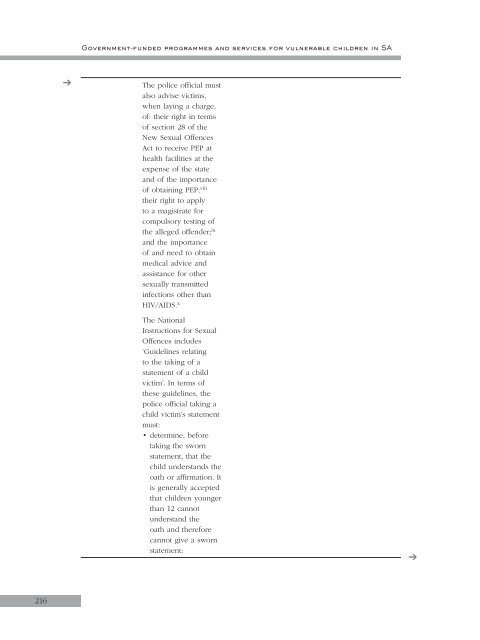Government-funded programmes and services for vulnerable - Unicef
Government-funded programmes and services for vulnerable - Unicef Government-funded programmes and services for vulnerable - Unicef
Department of Police, SAPS and the NPA ➔ deliberate neglect and exploitation under the Children’s Act and the Children’s Amendment Act; pornography in terms of the Films and Publications Act. Protection and support services for children who are victims of sexual offences and exploitation The new Sexual Offences Act together with the National Instructions 3/2008 on Sexual Offences make provision for a number of support services to be provided by the SAPS for victims of sexual offences. Targeted beneficiaries Children younger than 18 who are victims of sexual offences as defined in the previous rows Ideally the FCS officers/units within SAPS, failing which, any police official When a victim reports a sexual offence, the police official must: take the victim’s statement in a private space; provide reassurance to the victim of his or her safety; determine if the victim requires medical assistance and, if so, make arrangements for him or her to obtain it; ask the victim if they would like another person present; record the victim’s statement in writing; be mindful of the victim’s emotions when taking the statement; and open a docket and register it. vii ➔ 215
Government-funded programmes and services for vulnerable children in SA ➔ The police official must also advise victims, when laying a charge, of: their right in terms of section 28 of the New Sexual Offences Act to receive PEP at health facilities at the expense of the state and of the importance of obtaining PEP; viii their right to apply to a magistrate for compulsory testing of the alleged offender; ix and the importance of and need to obtain medical advice and assistance for other sexually transmitted infections other than HIV/AIDS. x The National Instructions for Sexual Offences includes ‘Guidelines relating to the taking of a statement of a child victim’. In terms of these guidelines, the police official taking a child victim’s statement must: taking the sworn statement, that the child understands the oath or affirmation. It is generally accepted that children younger than 12 cannot understand the oath and therefore cannot give a sworn statement; ➔ 216
- Page 175 and 176: Government-funded programmes and se
- Page 177 and 178: Government-funded programmes and se
- Page 179 and 180: Government-funded programmes and se
- Page 181 and 182: Government-funded programmes and se
- Page 183 and 184: Government-funded programmes and se
- Page 185 and 186: Government-funded programmes and se
- Page 187 and 188: CHAPTER 6 Department of Labour Intr
- Page 189 and 190: Government-funded programmes and se
- Page 191 and 192: Government-funded programmes and se
- Page 193 and 194: Government-funded programmes and se
- Page 195 and 196: Government-funded programmes and se
- Page 197 and 198: Government-funded programmes and se
- Page 199 and 200: Government-funded programmes and se
- Page 201 and 202: Government-funded programmes and se
- Page 203 and 204: Government-funded programmes and se
- Page 205 and 206: Government-funded programmes and se
- Page 207 and 208: CHAPTER 10 Department of Human Sett
- Page 209 and 210: Government-funded programmes and se
- Page 211 and 212: Government-funded programmes and se
- Page 213 and 214: Government-funded programmes and se
- Page 215 and 216: Government-funded programmes and se
- Page 217 and 218: Government-funded programmes and se
- Page 219 and 220: Government-funded programmes and se
- Page 221 and 222: Government-funded programmes and se
- Page 223 and 224: Government-funded programmes and se
- Page 225: Government-funded programmes and se
- Page 229 and 230: Government-funded programmes and se
- Page 231 and 232: Government-funded programmes and se
- Page 233 and 234: Government-funded programmes and se
- Page 235 and 236: Government-funded programmes and se
- Page 237 and 238: Government-funded programmes and se
- Page 239 and 240: Government-funded programmes and se
- Page 241 and 242: Government-funded programmes and se
- Page 243 and 244: Government-funded programmes and se
- Page 245 and 246: Government-funded programmes and se
- Page 247 and 248: Government-funded programmes and se
- Page 249 and 250: Government-funded programmes and se
- Page 251 and 252: Government-funded programmes and se
- Page 253 and 254: Government-funded programmes and se
- Page 255 and 256: Government-funded programmes and se
- Page 257 and 258: Government-funded programmes and se
<strong>Government</strong>-<strong>funded</strong> <strong>programmes</strong> <strong>and</strong> <strong>services</strong> <strong>for</strong> <strong>vulnerable</strong> children in SA<br />
➔<br />
The police official must<br />
also advise victims,<br />
when laying a charge,<br />
of: their right in terms<br />
of section 28 of the<br />
New Sexual Offences<br />
Act to receive PEP at<br />
health facilities at the<br />
expense of the state<br />
<strong>and</strong> of the importance<br />
of obtaining PEP; viii<br />
their right to apply<br />
to a magistrate <strong>for</strong><br />
compulsory testing of<br />
the alleged offender; ix<br />
<strong>and</strong> the importance<br />
of <strong>and</strong> need to obtain<br />
medical advice <strong>and</strong><br />
assistance <strong>for</strong> other<br />
sexually transmitted<br />
infections other than<br />
HIV/AIDS. x<br />
The National<br />
Instructions <strong>for</strong> Sexual<br />
Offences includes<br />
‘Guidelines relating<br />
to the taking of a<br />
statement of a child<br />
victim’. In terms of<br />
these guidelines, the<br />
police official taking a<br />
child victim’s statement<br />
must:<br />
<br />
taking the sworn<br />
statement, that the<br />
child underst<strong>and</strong>s the<br />
oath or affirmation. It<br />
is generally accepted<br />
that children younger<br />
than 12 cannot<br />
underst<strong>and</strong> the<br />
oath <strong>and</strong> there<strong>for</strong>e<br />
cannot give a sworn<br />
statement;<br />
➔<br />
216



